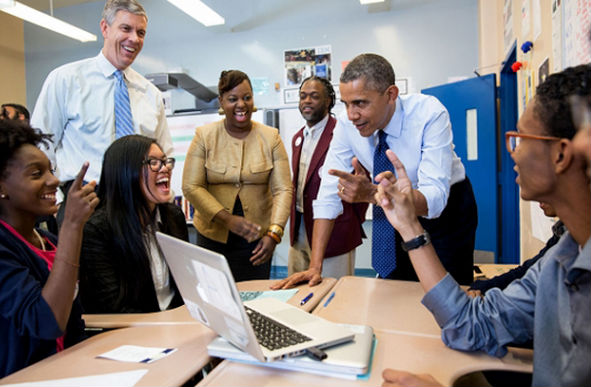Transforming Education Beyond Common Core: Arne Duncan’s “Classroom of the Future”
Last month, Secretary of Education Arne Duncan described his “vision for the classroom of the future” in what he hoped would be the first of many posts on the site called Bright (at medium.com), which is funded by the New Venture Fund, a non-profit that supports public interest projects in education, global issues, public health, and other issues.
The classroom of the future, wrote Duncan, would involve the “digital revolution,” as he presented reasons quasi-syllogistically: “In the United States, education is meant to be the great equalizer. Technology has the potential to bridge gaps for those who have the least. Simply put, technology can be a powerful tool for equality as well.”
Of course, many would differ with him about the major premise: that education is meant to be the great equalizer, at least in the way that Duncan and this administration think of it – as ending the achievement gap, with that duty falling to the federal government. Other departmental missives have promoted the same goals. Duncan has put pressure on states for “equitable funding” of school districts to overcome racial disparities, and has called for increased federal funding through the Elementary and Secondary Education Act (ESEA) to overcome disparities of the “tax base” in communities.
Similarly, the Department recently cast the opting-out of Common Core tests as a lack of concern about “underserved populations,” recalling the comment made by Duncan in 2013 about Common Core opponents being “white suburban moms.”
The Department has been redefining education, emphasizing behavior and attitudes over academics, and even casting awareness about racial and ethnic identity as overlooked evidence of intelligence. Education is no longer about teachers imparting knowledge to their students. Linda Darling-Hammond, leader of Obama’s education transition team and developer of one of the two Common Core national assessments, has repeatedly disparaged traditional assessments that objectively test students’ knowledge as skill and drill. In this she follows progressive and radical educators who see their roles as developing agents of social change, agents who do not learn in the traditional Eurocentric linear and logical way, but emotively and tactilely.
Replacing our traditional ways of learning, through reading, writing, and study—contemplative and solitary activities—are the communal and hands-on activities promoted in Common Core and now digital learning. Both Common Core and digital learning serve to obscure a large part of the reason for the achievement gap: reading ability. Students who are poor readers lag in other subjects. To cover up this inability, Common Core emphasizes “speaking and listening skills,” (with points given for behavior and attitudes, such as the ability to work with “diverse” groups) and group work, where lagging students are coached along by others as they do “close readings” of short passages. This ensures that all students have mastered the same (minimal) level of knowledge. Similarly, games offer an opportunity to hide differences in ability. Information is delivered through images and sound, not words on a page, and at a pace that the student directs. Duncan writes that technology is “helping teachers to use their time and talents more effectively to personalize learning for students — tailoring the pace, approach, and context of the learning experience to students’ individual needs and interests.”
Additionally, technology alters the relationship between teachers and students, leveling the relationship even further than the currently fashionable one of teacher as “facilitator.” The student presumably gains the information on his own and applies that knowledge to “real-world” problems. Duncan writes:
Until recently, the main function of public education has been to convey knowledge in one direction, from teachers to students. But with the growth of the Internet and mobile technology, our relationship to knowledge has fundamentally changed. To succeed in today’s world, our students need to be adept at not only recalling information, but using their knowledge to conceive, create, and employ solutions to real-world problems.
Duncan then employs the much-used strategy of reductively stereotyping traditional education, as he writes, “Students aren’t vessels to be filled with facts. And educators aren’t simply transmitters of information.”
In this schema, little attention is paid to “recalling information”—or the acquirement of knowledge. Emphasis is placed on the ability to – through the wonders of technology – find information. (Of course with little concern about the ability to discern among the sources of information.)
In Duncan’s estimation, technology is the great liberator, unleashing children’s creativity and natural ability to solve problems. It’s the ultimate instantiation of the progressive idea that students simply “discover” knowledge through their own creativity and curiosity – a theory which has time and again been disproven by the data, as Jeanne Chall and her student Sandra Stotsky have shown.
Aside from the logical impossibility of doing “real-world” problem-solving outside the real world, i.e., in a classroom and with children, such a focus away from objective measurements to hypothetical problems and solutions is another way to ensure equality of outcomes.
For those teachers who agree to promote such pedagogies, the Department of Education has many awards and ambassadorships to bestow.
EDITORS NOTE: The next installment will discuss the latest effort by the Department to promote digital learning, as described enthusiastically by a teacher and a U.S. Department of Education “Teaching Ambassador Fellow.”


